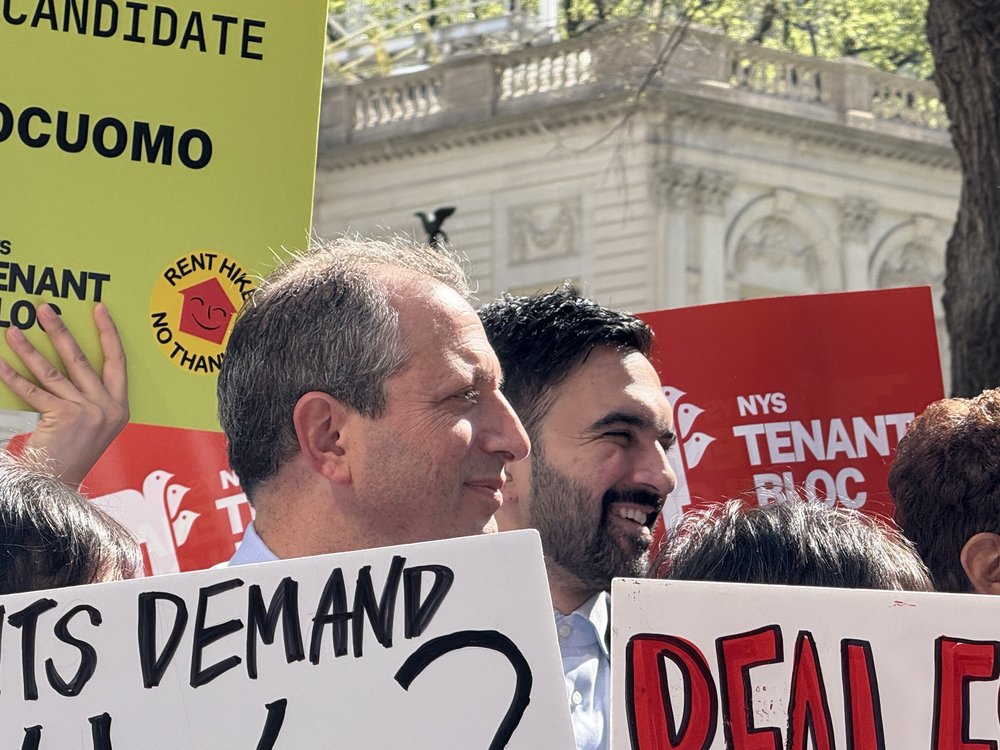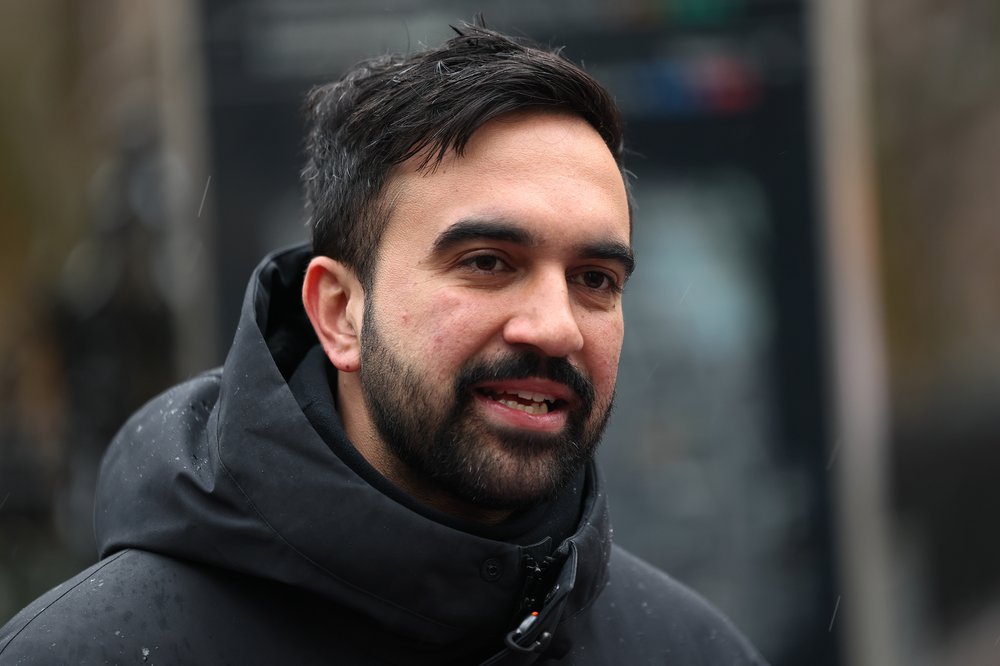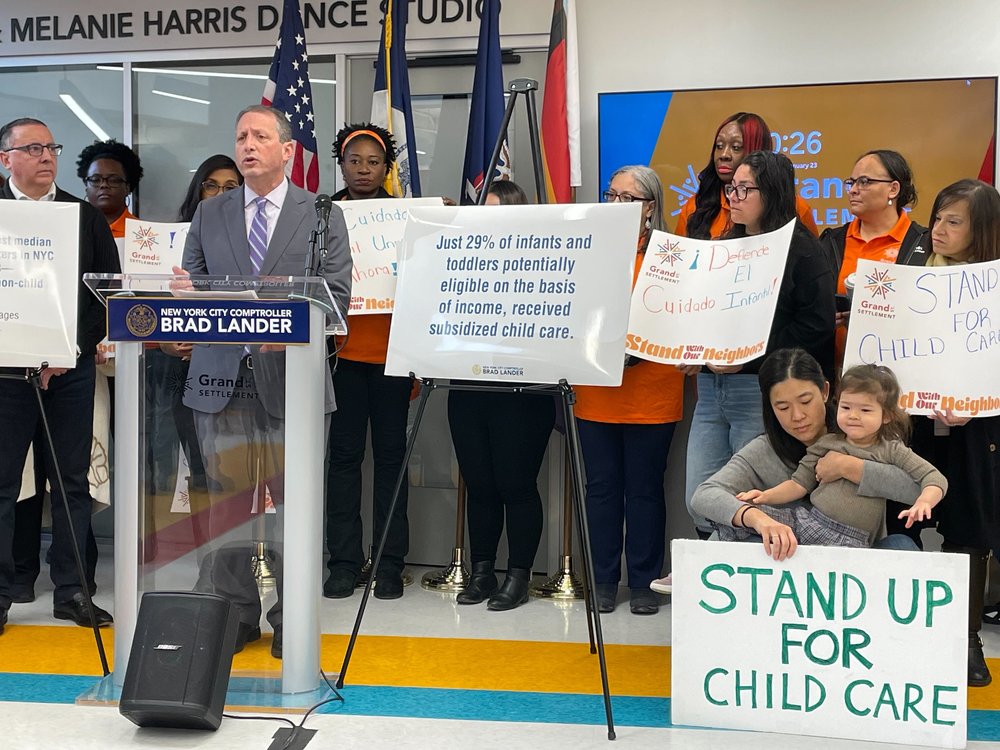Inside NYC progressives' battle to pick Zohran Mamdani or Brad Lander for mayor
April 21, 2025, 6 a.m.
Progressives have been warned to "consolidate or die." Both candidates are competing to be the Working Families Party's top choice.

Zohran Mamdani and Brad Lander are playing nice. Both candidates are competing for the top progressive slot in New York City's mayoral race, and unlike many candidates in many other primaries, they have not criticized each other on the campaign trail. They've reserved their attacks for front-runner Andrew Cuomo, aiming to make the most out of the city's ranked-choice voting system.
But inside a leading progressive political organization, a familiar struggle has emerged. The Working Families Party is in the process of choosing which of its four endorsed candidates should be the party’s top pick for mayor – locking Mamdani and Lander’s supporters in a brewing battle.
Some want their top candidate to distinguish themself from moderate Democrats by campaigning on left-leaning ideas – like Mamdani’s calls for free buses and freezing the rent. Others want a candidate willing to make pragmatic policy concessions, like Lander's pledges to expand policing amid public safety concerns.
“That’s a pain point the progressive space hasn’t solved,” said Na’ilah Amaru, a Manhattan chapter member of the Working Families Party who has worked in politics. “How do you find that balance of preserving and building political capital while saying you’re rooted in ideology?”
It’s a debate over what kind of progressive meets the current political moment, and its result could set the stage for other endorsements and coalesce the city’s left — or fracture it.
In a city as solidly Democratic as New York, the primary election is often the real contest, though the incumbent mayor’s independent run may complicate things this cycle. And with the city’s relatively new ranked-choice voting system, getting a coalition strategy right could propel the party’s left into power. Getting it wrong could further marginalize it.
“The purpose of a political party is to win elections,” Amaru said. “That’s how we build our governing power.”
Some observers point to Mamdani’s dominance in fundraising and polling as evidence that progressives should unite behind the more radical choice. Mamdani, a state assemblymember from Queens, received $4 million in public matching funds last week, the largest single payment to date in this year’s mayoral race. A Siena College poll released the same day showed him with half Cuomo’s poll numbers – but still far above the rest of the pack.
Bill Neidhardt, a progressive strategist who worked for former Mayor Bill de Blasio, wrote on X: “The message from this poll to all Anti-Cuomo Democrats: Consolidate or die.”
“I think the strongest argument is for Zohran,” said Neidhardt, who is now an adviser for New Yorkers for Lower Costs, a PAC supporting Mamdani. “If someone has another opinion, I'm not gonna get into a nasty fight with them, but I do think it is very important that Democrats coalesce around someone they believe has the resources, support and message to win.”

Lander, the city comptroller, has long enjoyed the trust of progressives as a veteran elected official. But his shift to the center on some issues has rankled some left-wing Working Families Party members.
The party interviewed candidates and selected four to endorse last month: Lander, Mamdani, City Council Speaker Adrienne Adams and state Sen. Zellnor Myrie. But it’s committed to making a first-rank pick.
By multiple accounts, the contest for first place is tight. The weight of the decision was reflected during a heated closed-door endorsement interview last month, when party members sharply criticized Lander for what some saw as his changing stances on issues like policing, according to three people familiar with the discussions.
In an interview with Gothamist, Lander said he welcomed the “blunt dialogue,” arguing that tough conversations would help the party pick a coalition that can win the mayoral race.
He also defended his shift on public safety. In 2020, Lander joined a wave of progressive elected officials who supported the “defund the police” movement, which argued money should be redirected from policing to other priorities like social services. He now supports hiring more police officers and a push to make it easier for the city to involuntarily commit people who appear to be mentally ill.
“I think progressives, myself included, were slow to reckon with the rising sense of disorder, mental health issues, homelessness and crime coming out of the pandemic,” Lander said. “And that has had both social and political consequences that we're dealing with now.”
While some members criticized Lander’s move to the middle, others expressed concerns that Mamdani’s left-leaning stances leave him vulnerable to attacks from Cuomo and the right. Unlike Lander, Mamdani has not called to hire more police. Instead, he has said he would expand mental health and other specialized outreach teams to work with people who are homeless or seem unstable.
And a key source of controversy is Mamdani’s criticism of Israel over its war in Gaza — a divisive issue among Democrats, especially for those concerned about Jewish voters’ support. Mamdani is the lead sponsor of a state bill to ban New York nonprofits from funding illegal Israeli settlements. Opponents have labeled him antisemitic; Mamdani has argued he’s defending human rights.
“We want equality and we want respect in this city and in this country,” Mamdani, who would be the city’s first Muslim mayor, told worshippers last month at a mosque in East New York. “To win those things, we also have to win them at the ballot box.”
Lander’s supporters point to his long history with progressives and the trust he has built with community organizers. In 2009, as a city councilmember from Brooklyn, he co-founded the Council’s Progressive Caucus.

Lander's supporters point to his pragmatism and relationships with community organizers.
“He actually knows the ins and outs of government better than anyone else,” said Daniel Coates, a political director at the immigrant advocacy group Make the Road Action, one of the Working Families Party’s affiliate groups.
Affiliate organizations like Make the Road hold powerful sway in the party’s endorsement decisions. There are 17 of them, including labor unions and community-based membership nonprofits, which join with borough-based chapters to form a regional advisory committee. The first-choice candidate will have to win 60% of votes in the advisory committee to win the whole party’s endorsement recommendation.
Lander has so far received the first choice backing of three affiliate organizations: the New York Progressive Action Network, a group with ties to Bernie Sanders; Make the Road Action, an immigrant advocacy group; and Churches United For Fair Housing Action. Mamdani has been ranked first by New York Communities for Change, a grassroots progressive group that was instrumental in raising New York’s minimum wage.
While the debate over first choice drags on, party members have been asked not to disparage any of the endorsed candidates.
Despite his organization’s preference for Lander, Coates made a point of praising Mamdani, whom his group has endorsed as its second choice alongside Adrienne Adams. He credited Mamdani with bringing “fresh energy, ideas and expanding what we believe we can accomplish as a city.”
But there are still unanswered questions about both candidates, including whether they can attract Black voters, who are often considered more moderate and seen as crucial toward winning a citywide election.
A spokesperson for the Working Families Party declined to comment on this story. But this year, party leaders have said they plan to learn from the 2021 ranked-choice mayoral primary. That year, the party’s two top ranked candidates, Scott Stringer and Diane Morales, imploded due to scandals. Many experts say progressives took too long to unite around Maya Wiley, the party’s third-ranked candidate.
Last week, a group of seven Democratic elected officials led by U.S. Rep. Nydia Velazquez endorsed Mamdani, Lander and Adrienne Adams, the City Council speaker who is also backed by the Working Families Party.
But if voters want to maximize their ranked-choice ballots, they need to fill all five slots – not three or four – because unless one candidate achieves a clear majority, elections officials tabulate and redistribute voters’ remaining choices lower on the ballot. And it’s unclear how voters will absorb a recommendation of three candidates without a clear first choice. Those who have backed Cuomo, for example, have only endorsed him.
Amit Bagga, a Democratic strategist who is not working on any of the mayoral campaigns, said many Democratic primary voters didn’t take full advantage of their ballots in 2021. Less than half of them ranked five candidates.
“This year, the progressive candidates understand they need to leverage the power of ranked choice to beat Andrew Cuomo,” Bagga said. “The question remains: How will they do it?”
This story has been updated with additional information.
NYC progressives want to beat Adams and Cuomo. Can they set aside their differences? Working Families Party endorses 4 NYC mayoral candidates In NYC mayoral race, will AOC help progressives beat Andrew Cuomo?